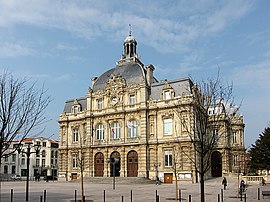Loading AI tools
Commune in Hauts-de-France, France From Wikipedia, the free encyclopedia
Tourcoing (French: [tuʁkwɛ̃] ; Dutch: Toerkonje [tuːrˈkɔɲə]; West Flemish: Terkoeje; Picard: Tourco) is a city in northern France on the Belgian border. It is designated municipally as a commune within the department of Nord.[3] Located to the north-northeast of Lille, adjacent to Roubaix, Tourcoing is the chef-lieu of two cantons and the fourth largest city in the French region of Hauts-de-France ranked by population with about 97,000 inhabitants.
Tourcoing
| |
|---|---|
 | |
| Coordinates: 50°43′26″N 3°09′40″E | |
| Country | France |
| Region | Hauts-de-France |
| Department | Nord |
| Arrondissement | Lille |
| Canton | Tourcoing-1 and 2 |
| Intercommunality | Métropole Européenne de Lille |
| Government | |
| • Mayor (2020–2026) | Doriane Bécue[1] (DVC) |
| Area 1 | 15.19 km2 (5.86 sq mi) |
| Population (2021)[2] | 99,011 |
| • Density | 6,500/km2 (17,000/sq mi) |
| Time zone | UTC+01:00 (CET) |
| • Summer (DST) | UTC+02:00 (CEST) |
| INSEE/Postal code | 59599 /59200 |
| Elevation | 67 m (220 ft) |
| 1 French Land Register data, which excludes lakes, ponds, glaciers > 1 km2 (0.386 sq mi or 247 acres) and river estuaries. | |
Together with the cities of Lille, Roubaix, Villeneuve-d'Ascq and eighty-six other communes,[4] Tourcoing is part of four-city-centred metropolitan area inhabited by more than 1.1 million people: the Métropole Européenne de Lille.[5][6][7] To a greater extent, Tourcoing belongs to a vast conurbation formed with the Belgian cities of Mouscron, Kortrijk and Tournai, which gave birth to the first European Grouping of Territorial Cooperation in January 2008, Lille–Kortrijk–Tournai with an aggregate of just over 2 million inhabitants.[8]

The city was the site of a significant victory for France during the French Revolutionary Wars. Marshal Charles Pichegru and his generals Joseph Souham and Jean Moreau defeated a combined force of British and Austrian troops in the Battle of Tourcoing on 29 Floréal II (18 May 1794).[9]
|
| ||||||||||||||||||||||||||||||||||||||||||||||||||||||||||||||||||||||||||||||||||||||||||||||||||||||||||||||||||
| |||||||||||||||||||||||||||||||||||||||||||||||||||||||||||||||||||||||||||||||||||||||||||||||||||||||||||||||||||
| Source: EHESS[10] and INSEE (1968-2017)[11] | |||||||||||||||||||||||||||||||||||||||||||||||||||||||||||||||||||||||||||||||||||||||||||||||||||||||||||||||||||
The Tourcoing station is a railway station offering direct connections to Lille and Paris (high speed trains), Kortrijk, Ostend, Ghent and Antwerp. The town was formerly served by the Somain-Halluin Railway.
Guilbert de Lannoy (1545-c. 1601) and his son Jean de Lannoy (1575-c. 1605) were Protestants from Tourcoing who resettled in Leiden, Holland. Jean's son, Philip Delano (c. 1603 - c. 1681-82; born Philipe de la Noye or Philipe de Lannoy), was an early emigrant to the Plymouth Colony and progenitor of the prominent Delano family, which counts among its descendants prominent figures in American history, including president Franklin Roosevelt.[13]
In 2013, Maxime Piquette and Charles De Potter founded iCreo, a digital audio company in Tourcoing. The company created RadioKing, a platform for internet radio, and Ausha, a platform for podcast hosting and marketing.[14] It received support from regional funders, Nord France Amorquage and IRD Gestion.[15] The company is now the platform for media outlets Le Figaro, Liberation, l'Équipe and AFP, as well as large corporations and independent content producers.[16]

Tourcoing is twinned with:[17]
Seamless Wikipedia browsing. On steroids.
Every time you click a link to Wikipedia, Wiktionary or Wikiquote in your browser's search results, it will show the modern Wikiwand interface.
Wikiwand extension is a five stars, simple, with minimum permission required to keep your browsing private, safe and transparent.